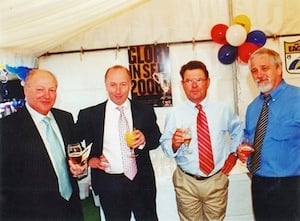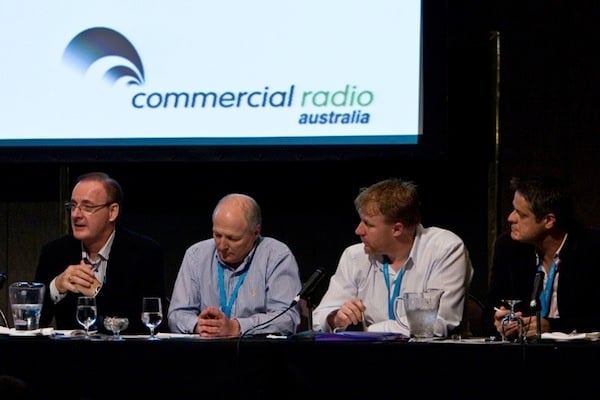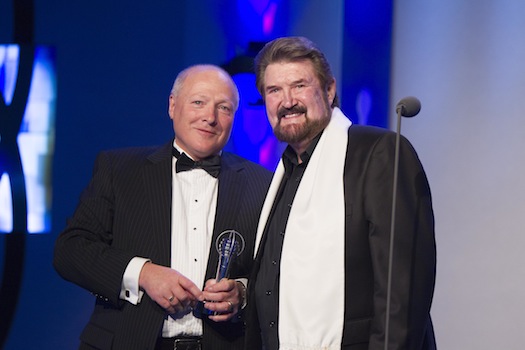Until last Saturday night, there were two things Graham Mott did not know: what really happened to Harold Holt and that he was going to be inducted into the Radio Hall of Fame. “I had no idea whatsoever. It wasn’t until Derryn started speaking and talking about things this person had done that I started thinking, “Gosh- someone’s got a story similar to mine.I should know who that is. And then he said it was someone who’d sacked him, and I thought, ‘now it is getting warm because I’d certainly done that. And then towards the end, I thought maybe it is me.’”
Joan Warner at CRA conspired with Motty’s wife Kerri to keep the plot from him.
On with the story. In this instalment, Mott talks about why he walked out of 2WS when Clear Channel took over. Why Ray Hadley defected from 2UE to 2GB and why Neil Mitchell turned down an offer to go to MTR. And finally, why Mott quit Fairfax and turned down an offer to stay ona as a consultant.
In 1994 Clear Channel bought half of 2WS and Tony O’Reily’s APN group bought the other half. “The Irish and the Americans didn’t agree with each other,” recalls Mott, “And the Americans thought they could squeeze another two million profit out of it. At the time it was making a clear 40% profit and I thought that was pretty good. I thought the only way they could do better was to restructure, and I said if you want to do it you can do it without me.”
Soon after he left what became ARN, he heard his old mate Tony Bell was looking for someone to take over the helm at 3AW, and made a call. Bell agreed to meet when he was next in Sydney but showed little enthusiasm. Yet, says Mott, “After about 10 minutes into the meeting he offered me the job. After we had done the deal I asked him why he showed such a lack of interest. He said it probably would have cost him too much money if he had shown more. That’s is how I learnt my commercial negotiating skills.”
For Mott it was another adventure in his career. For his long suffering wife Kerri, it was another move away from family and friends. Such is the toll this business can wreak upon loved ones.
As a PD, Mott had had little direct input into sales prior to him running 2WS but again, his instincts regarding everything to do with broadcasting were on the money, “I was always a very bottom line driven program director. I’ve got a good business head. And this is a business. And at the end of the day I realised you have revenue and you have product – which in our business was called programming – now it is called content. And I knew that without revenue and programming you didn’t have a business. And I knew that the two had to marry. The two had to understand each other and you had to break down the walls.”
On the whole life at AW was good. But later on, when Southern Cross expanded into Sydney and bought 2UE some decisions would be made against his advice, the results of which he was left to manage as best he could. In particular, he was dismayed at 2UE losing both Alan Jones and Ray Hadley to 2GB.
“I thought that the Hadley matter was handled badly. I don’t know enough about the Jones matter and at the end of the day I believe that Sam Chisolm brokered the deal between Jones and Singleton and I don’t really know about that.
“But in regards to Hadley. I have to say that I thought the Hadley thing was handled poorly. I had known Ray for quite a long time through the Sydney market and we enjoyed a bit of a joke with each other. He was at 2UE when I was still at 2WS and we sponsored the Parramatta NRL team and I would see him out at the broadcast box. He was there for 2UE and I’d be there with clients of 2WS.
Ray called me and said ‘Who’s this Tony Bell?’ and he sounded pretty concerned. I think the biggest mistake they made was – and remember when I tell you this story – Ray Hadley had been filling in for John Laws for 10 years, and he felt honoured to do that. Ray wasn’t so much interested in the money part. He could back himself on being able to negotiate a deal. He was concerned about whether he would still get to fill in for Laws.
And they told that no, they were moving in a different direction. And that killed him. That was the beginning of the end. And I thought that the then station manager David Bacon and Tony Bell had misread the situation. I tried to get involved to patch it up but unfortunately the horse had bolted by then and Singo was around at just the right time.”
Losing Jones and Hadley over a decade ago turned out to be a huge blow to Southern Cross and one from which neither they nor the current owners, Fairfax have been able to recover. From owning a network that controlled the number one station in both Sydney and Melbourne, they managed to relegate Sydney’s 2UE to tenth place as of the latest survey.
 Things may have become even worse if the launch of MTR had the impact on 3AW that the Macquarie Radio Network hoped that it would. Having lost Steve Price to the upstart station from 2UE, 3AW came very close to seeing their top rating morning personality, Neil Mitchell, also defect.
Things may have become even worse if the launch of MTR had the impact on 3AW that the Macquarie Radio Network hoped that it would. Having lost Steve Price to the upstart station from 2UE, 3AW came very close to seeing their top rating morning personality, Neil Mitchell, also defect.
“The Negotiation was tough, no doubt about that.” says Mott, “And lets face it, once somebody else wants your services, the current person who employs you is going to have to up the ante, there is no question about that. (Pic: L-R, Graham Mott, Shane Healy, Steve Price, Neil Mitchell).
“What came into play here in our favour was that we had stability. We were a very good operation with a rock solid line up and a fantastic breakfast lead in for Neil and I don’t know whether I should tell this story but I will tell it anyway, Neil wasn’t going to be mornings at MTR he was going to be doing breakfast and Neil would have been up against Ross Stevenson and John Burns. And that is one battle I reckon that you don’t want to take on and Neil was much better off staying at 3AW rather than taking a significant risk with his career.
“I respect Neil. I reckon he is one of the best and hardest working ethical operators I have ever worked with. I think at the end of the day a man sums up where he probably knows that he can continue to do well, but also would probably think, well I would like this challenge, but you have to wonder too how committed Macquarie were coming into the market – and I said to Neil, ‘In my opinion if they don’t have short term success they will get very bored very quickly and they will be out of there.’ And I was proved to be right.”
“They expected some immediate success. They set themselves a target that they wanted the station to be at 6 share by the end of the year. They went on the air in April and they never got anywhere near that. They never got beyond 3. And I think Neil was very lucky…we were very lucky to keep Neil and to tempt him to stay with us, and I think he was very lucky that he made the decision to stay with us because it could have been an absolute disaster.”
If 3AW had lost Mitchell to MTR, things may have been very different, but Mott insists that it would not have been enough for MTR to succeed.
“We will never never know. But I believe that on breakfast, up against Ross Stevenson and John Burns it would have been very difficult for him to make an impact.
“Even though I rate Neil very highly, my understanding over the years is that audiences don’t change because they grow tired of you. They change because you give them reasons to tune out. And at 3AW, we made sure we operated in a way that we didn’t give people reasons to tune out. You have to make sure that what you do is brilliant. You have got to make sure that what you do you concentrate on and deliver on And while you are aware of what the other guy is doing you do not become preoccupied with what the other guy is doing. And what we did that whole time when MTR came along is that we did not give our audience any reason to tune out and I think we did a brilliant job and I think that is what we would have done had we lost Neil but I have no doubt that the task would have been a lot harder had we of lost Neil,” says Mott.
It was the last few years under Fairfax that Mott admits were the most difficult and enervating of his career. “I have to say I am not blaming Fairfax,” says Mott, “I think the situation is difficult. Fairfax bought the southern cross radio network in November 2007 and Fairfax’s price (one the stock exchange) at that time was $4.09. Today it sits just below 40c. Back then they were a nine billion dollar company, and today they are worth less than a billion.
“The debt that they incurred in buying the radio stations in amongst a $9 billion valuation, doesn’t sound so bad. But when you pay too much from an asset it is always going to be an uncomfortable ride.
“I very quickly realised there was not a very good unanimous feeling on the board about buying the asset. And once Ron Walker, the former chairman left, Brian McCarthy who replaced him was bluntly honest that they should never have bought into radio. And when he became CEO, he told me that several times. In fact, he told me that too many times. ‘I get the message Brian,’ I used to say.
I found that being the CEO of the network, and having an owner with little interest in the asset, was a really lonely place to be.
On top of that, I was diagnosed with cancer. And I thought WOW, I cant believe this! And then going through a sale last year was extremely difficult. And I look back now and I think I don’t know how I did that,” says Mott.

Pic L-R: Rod Brice, Graham Mott, Dan Badley and Guy Dobson.
Life threatening illnesses tend to have an affect on even the most grounded of individuals, and Mott found himself re-evaluating his life, “I learned a lot about myself and what I was capable of, both physically and mentally,” he says, “But in the end, I don’t believe I was performing at my best. In the end I made some mistakes. I wasn’t focused enough on the job. I was more focused on providing information about the sale. And I think that the business suffered because of that.
“I felt disappointed and I felt more that I let both me and the company down. And I always thought that in the sale process that the new owners probably wouldn’t need our corporate office – including me. So, I thought that at the end of the sale process I would go away and look for something else to do,” says Mott.
After all those months of showing prospective buyers around and expecting to be discarded by the highest bidder, the whole thing came to a giant anti-climax. With no-one coming close to the figure that Fairfax was banking on to effect the sale, they had no choice but to hang on to the network.
But by this time, Mott had had enough. “I came to the conclusion that I was much better as a station GM than I was as a CEO of a network. I got to know my limitations, and combined with the fact that I was fighting a life threatening disease I think all the timing came together. And I thought, nuh, I don’t want to do this anymore.
I think quite frankly if I would not have gone (of my own accord) I probably would have been flipped anyway.”
Whether that was going to be the case, he’ll never know. But such was the esteem in which he was held, that when he resigned, Fairfax Radio made him a generous offer to stay on as a consultant. He thought about it long and hard. Yet, as flattering as it was, he turned them down.
“There is nothing worse than the old boss hanging on. They need to get on with their job and I need to get on with my life. We would have been in conflict.
One great example is the decision to dump Derryn Hinch. I would never have agreed to that. And as a consultant I would have just had to have said my piece, but I would not have been in control. I would have been quite annoyed.
No, I think that the old boss hanging around is never a good idea. It is a better idea to move on so I have gone into a somewhat early retirement but it is not the last chapter in my radio career,” says Mott.
In Part Three of our long discussion with Graham Mott, he talks about the future of radio as a business, the impact of social media and what 2GB could have done better in with the Alan Jones advertising boycott.
Read Part One. Part Three.
Peter Saxon

